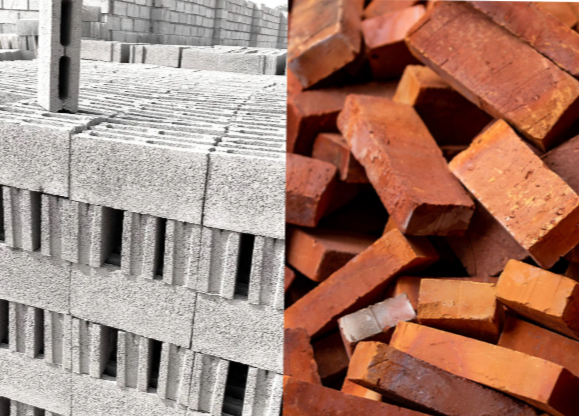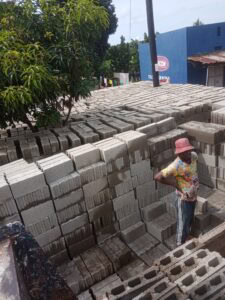When beginning a construction project, one of the key decisions you will face is choosing the right building material. Bricks and blocks are two popular options, Each offering unique advantages and considerations. In this article, we will explore the differences between bricks and blocks helping you make an informed decision for your construction project.Understanding Bricks and Blocks:
Before we delve into the comparison, let’s clarify what bricks and blocks are.
Bricks
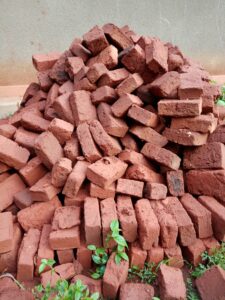
Bricks are small rectangular units made of fired clay or concrete, typically used for walls, facades, and paving. Blocks, on the other hand, are larger rectangular or square units made of concrete or other materials, commonly used for load-bearing walls and structural elements in construction.
Advantages of Bricks:
Bricks have been used in construction for centuries, prized for their durability, aesthetic appeal, and thermal insulation properties. Here are some advantages of using bricks in your construction project:
Aesthetic Appeal:
Bricks offer timeless charm and visual appeal, adding character and warmth to any structure.
Durability:
High-quality bricks can withstand weathering, erosion, and fire, ensuring long-lasting performance.
Thermal Insulation:
Bricks provide excellent thermal insulation, helping regulate indoor temperatures and reduce energy costs.
Low Maintenance:
Bricks are low-maintenance and require minimal upkeep over their lifespan.
Environmentally Friendly:
Bricks are made from natural materials and can be recycled, making them an eco-friendly choice for sustainable construction.
Concrete blocks
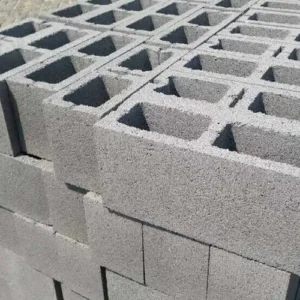
A concrete block, also known as a concrete masonry unit (CMU), is a rectangular building material made from a mixture of Portland cement, water, sand, and gravel or crushed stone. Concrete blocks are commonly used in construction for building walls, foundations, and other structural elements.
Advantages of Blocks:
Blocks, also known as concrete masonry units (CMUs), have become increasingly popular in modern construction due to their versatility and strength. Here are some advantages of using blocks in your construction project:
Strength and Load-Bearing Capacity:
Blocks are strong and durable, capable of supporting heavy loads and withstanding structural stresses.
Speed of Construction:
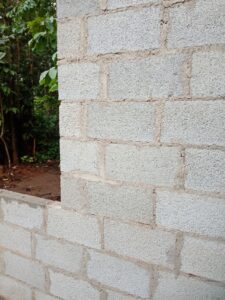
Blocks are larger than bricks, allowing for faster construction and reduced labor costs.
Design Flexibility:
Blocks come in various sizes, shapes, and finishes, offering design flexibility and versatility for architects and builders.
Fire Resistance:
Concrete blocks have excellent fire resistance properties, making them suitable for fire-rated walls and structures.
Cost-Effectiveness:
Blocks are typically more cost-effective than bricks, making them a budget-friendly option for large-scale projects.
Choosing the Right Material:
Now that we’ve explored the advantages of bricks and blocks, how do you choose the right material for your construction project? Consider the following factors:
Project Requirements:
Assess the specific requirements of your project, including structural integrity, aesthetic preferences, and budget constraints.
Design Considerations:
Consider the architectural style, design goals, and functional requirements of your building when selecting the building material.
Climate and Environmental Conditions:
consider the climate, weather patterns, and environmental factors of your project site, as these can impact the performance and longevity of the building material.
Local Availability and Regulations:
Consider the availability of bricks and blocks in your area, as well as any local building codes, regulations, and standards that may influence your decision.
Conclusion:
In conclusion, Bricks and blocks offer distinct advantages and considerations for construction projects. Whether you choose bricks for their timeless appeal and thermal insulation properties or blocks for their strength, versatility, and cost-effectiveness, the key is to carefully evaluate your project requirements and make an informed decision based on your specific needs and priorities. By choosing the right material, you can ensure a successful construction project that meets your goals for durability, attractiveness, and functionality.

